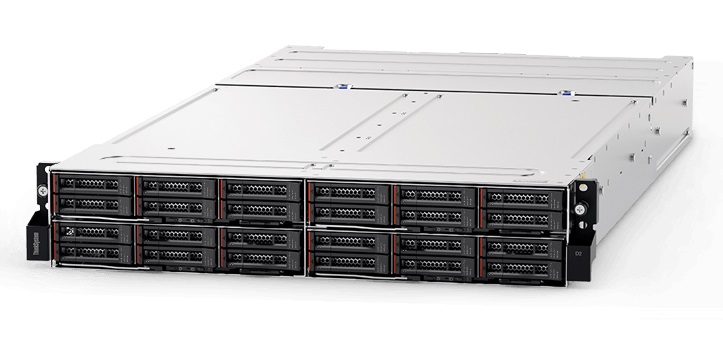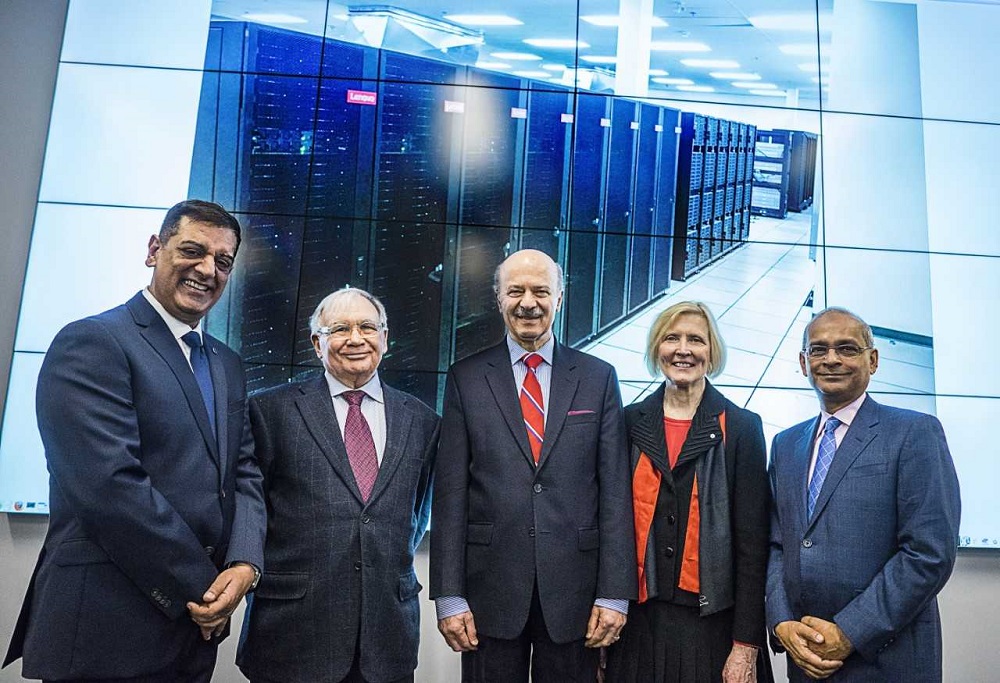SciNet and the University of Toronto today unveiled “Niagara,” Canada’s most-powerful supercomputer, comprising 1,500 dense Lenovo ThinkSystem SD530 high-performance compute nodes. Delivering 3 petaflops of Linpack performance, Niagara serves researchers across Canada in fields spanning artificial intelligence, astrophysics, high-energy physics, climate change, oceanic research and other disciplines using big data.

“There isn’t a single field of research that can happen without high-performance computing,” said SciNet’s CTO Daniel Gruner in a video presentation. “All Canadians will benefit from Niagara because basic research, fundamental research, is so important to the development of what we now call applied research. Without the basic research nothing can happen.”
Each of the system’s 1,500 nodes comes outfitted with two 20-core Intel Xeon Gold 6148 (2.4GHz) CPUs and 200 GB (188 GiB) of DDR4 memory. Filling up 21 racks, nodes are interconnected using Mellanox InfiniBand in a DragonFly+ topology and supported by more than 12 petabytes of Lenovo DSS-G high performance storage, based on IBM’s SpectrumScale file system. There is also a 256TB burst buffer (NVMe fabric, up to 160 GB/s) provided by Excelero for fast I/O.
Installation commenced at the end of November and acceptance testing was completed at the end of February. To break in Canada’s powerful research supercomputer, University of Toronto’s renowned climate scientist Richard Peltier is running a heroic ocean modeling calculation across the entirety of the machine. The work, already underway, is expected to lead to a greater understanding of the impact of ocean floor topologies on wave physics. The job is expected to take between one day and one week depending on resolution parameters; running an equivalent workload on the previous SciNet infrastructure would have taken roughly 20 times longer, according to the research team.
Niagara is replacing SciNet’s aging General Purpose Cluster (GPC) and Tightly Coupled Cluster (TCS), which have been providing Canada’s largest supercomputing center with the bulk of its compute cycles since 2009. TCS was SciNet’s first supercomputer; the 102-node IBM Power6 system was decommissioned and removed last year to make room for Niagara. GPC, SciNet’s 3,780-node IBM iDataPlex cluster, has been reduced by half and will be fully decommissioned when Niagara enters full production, which is expected to take place next month.
Niagara is one of four new systems being deployed to Compute Canada host sites. The others are Arbutus, a Lenovo-built OpenStack cloud system being deployed at the University of Victoria; Cedar, a 3.7-petaflop (peak) Dell system installed at Simon Fraser University, and Graham, a 2.6-petaflop (peak) Huawei-made cluster, located at the University of Waterloo.
With a peak theoretical speed of 4.61 petaflops and a Linpack Rmax of 3 petaflops, Niagara ranks among the top 10 percent of fastest publicly benchmarked computers in the world today. System maker Lenovo has made both HPC and supercomputing a priority since it acquired IBM’s x86 business for $2.1 billion in 2014 and its ambitions aren’t stopping. It’s deployed the fastest systems in Spain, Italy, Denmark, Norway, Australia, Canada, and soon in Germany with Leibniz Supercomputing Center, and it counts 87 Top500 systems (inclusive of all Top500 Lenovo classifications, i.e., Lenovo (81), Lenovo/IBM (3), IBM/Lenovo (2) and this collaboration). This puts it in second place by system share, behind HPE, and in third place after Cray and HPE based on aggregate list performance.
These system wins are part of an aggressive strategy that Lenovo is pursuing to become number one in HPC and supercomputing. “We want to be not just the fastest growing, which we are today both in HPC and Top500, but we want to be the largest by 2020,” Kirk Skaugen, executive vice president and president of the Data Center Group, told HPCwire in an interview at Supercomputing in Denver.
Lenovo’s third-quarter datacenter business exceeded Wall Street’s expectations, coming in at $1.2 billion in revenue, the highest in two years. This is 17 percent over the same period last year, and a significant increase of 26 percent over the previous quarter.
 Speakers at this morning’s launch included (from left to right): Nizar Ladak, President and CEO, Compute Ontario; Dr. Richard Peltier, Earth, Atmospheric and Planetary Physicist, University of Toronto; Minister Reza Moridi, Ministry of Research Innovation and Science; Dr. Roseann O’Reilly Runte, President and CEO, Canada Foundation for Innovation; and Dr. Vivek Goel, Vice President, Research and Innovation, University of Toronto.
Speakers at this morning’s launch included (from left to right): Nizar Ladak, President and CEO, Compute Ontario; Dr. Richard Peltier, Earth, Atmospheric and Planetary Physicist, University of Toronto; Minister Reza Moridi, Ministry of Research Innovation and Science; Dr. Roseann O’Reilly Runte, President and CEO, Canada Foundation for Innovation; and Dr. Vivek Goel, Vice President, Research and Innovation, University of Toronto.



























































